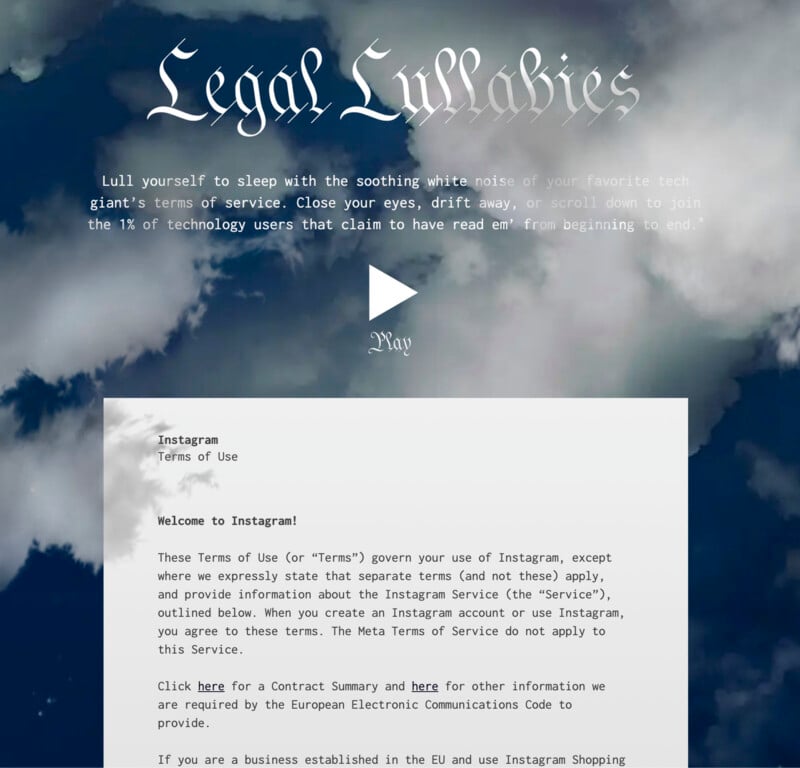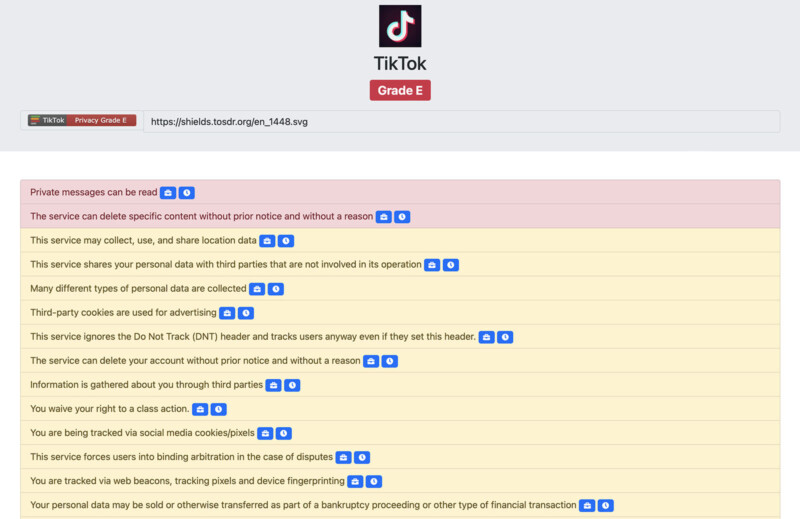‘Legal Lullabies’ Puts You To Sleep By Reading Social Media Terms of Use
![]()
“Apparently losing rights to data and legal recourse is not enough of a reason to inspect online contracts. So how can websites get users to read the fine print?” asks The Guardian. Perhaps people will listen to them if only to lull themselves to sleep.
As seen on Vice, the Lazy Data Research (TLDR) Institute decided that if people were not going to read the mind-numbing terms of service for popular social media platforms Instagram and TikTok, perhaps people could get use out of them as a replacement for counting sheep when trying to fall asleep.
The “Legal Lullabies,” hosted on the hilariously named website zzzuckerberg.com, are read by a voice actor with a smooth, soothing voice.

The Instagram version is 51 minutes long and the TikTok terms of use come in at around 38 minutes. While the average user can certainly read faster than the voice actor speaks the legalese, it is no surprise that practically nobody reads the terms of service for their favorite social media apps. They are dense, boring, and lengthy documents.
In the case of Instagram, its terms of use are relevant to photographers — assuming that the terms are legally enforceable. Some interesting bits of information are littered throughout the nearly hour-long “legal lullaby.”
![]()
For example, Instagram does not claim ownership of a user’s uploaded content, but Instagram does automatically receive a transferable, non-exclusive license to “use, distribute, modify, run, copy, publicly perform or display, translate, and create derivative works” of a user’s content.
Instagram does not own a user’s photos, but the company can use them however they see fit for as long as the images remain on the platform. When a user deletes their account or an individual photo, Instagram’s license to that user’s content ends.
In practical terms, this means that photographers retain the copyright to the work they upload to Instagram, but Instagram can use uploaded content as long as it remains on the platform. Instagram
As for TikTok’s policies, they are rather interesting. The company’s information and data collection policy seems extreme.
![]()
Alongside automatically having access to everything a user does on TikTok, including their messages, TikTok’s terms of use also outline that automatically-collected data includes all network information, location information, browsing history, and even audio and video information that exists within content that a user shares on TikTok. For example, TikTok may identify objects and scenery in a video. The app also collects biometric identifiers, including faceprints and voiceprints.
It all seems iffy when a person reads the full information policy, but admittedly, hearing someone read TikTok’s Terms of Service is relaxing and not at all terrifying.
While TikTok’s data usage documentation is potentially problematic, Isak Landaboure Lengholm, one of TLDR’s founders, tells Vice that Instagram’s terms of service is more difficult to understand.
“That being said, all of them balance the fine line of being almost understandable and completely incomprehensible at the same time. Occasionally, it’s like you’re stuck in a fever dream,” he says.
It is no surprise that one survey found that fewer than 10% of people read terms and conditions, while another puts the number at closer to just 1%. In that latter study, people agreed to terms of service that handed over naming rights to a user’s firstborn child.
Companies have even put prizes in their terms and conditions, with a Georgia high school teacher winning $10,000 for reading the terms of a travel insurance policy and emailing the company. The requirements were remarkably straightforward, and the insurance company, Squaremouth, matched the prize with a $10,000 contribution to Reading is Fundamental, a children’s literacy charity.
The Guardian highlights a gag clause in the terms and conditions of a public Wi-Fi service that said anyone who agrees must perform 1,000 hours of community service.
While stories like this are humorous and do not seem all that frightening, the issue of people agreeing to absurd terms and conditions underlies the problem that almost nobody knows how their data is collected and used by different apps and platforms. While large companies like Instagram (Meta) and TikTok (ByteDance) are handcuffed to some extent by significant regulatory oversight, smaller companies can get away with some especially shady practices. (https://petapixel.com/2023/04/27/bereal-owns-your-photos-for-30-years/)

Even with these warnings, most people will not read the terms and conditions. That is understandable, as the documents are so dull that they can literally put people to sleep. However, people should, at the very least, consult Terms of Service Didn’t Read (TOSDR), an online platform that provides summaries of the terms of service for websites and apps.
Instagram and TikTok get “E” grades, which is terrible.
Image credits: Header photo licensed via Depositphotos.